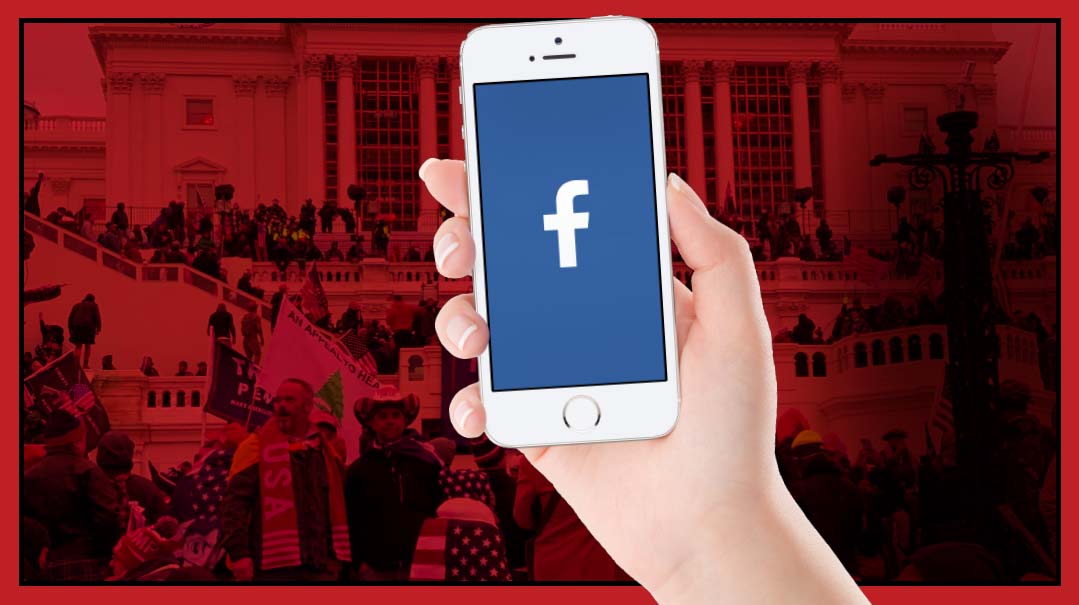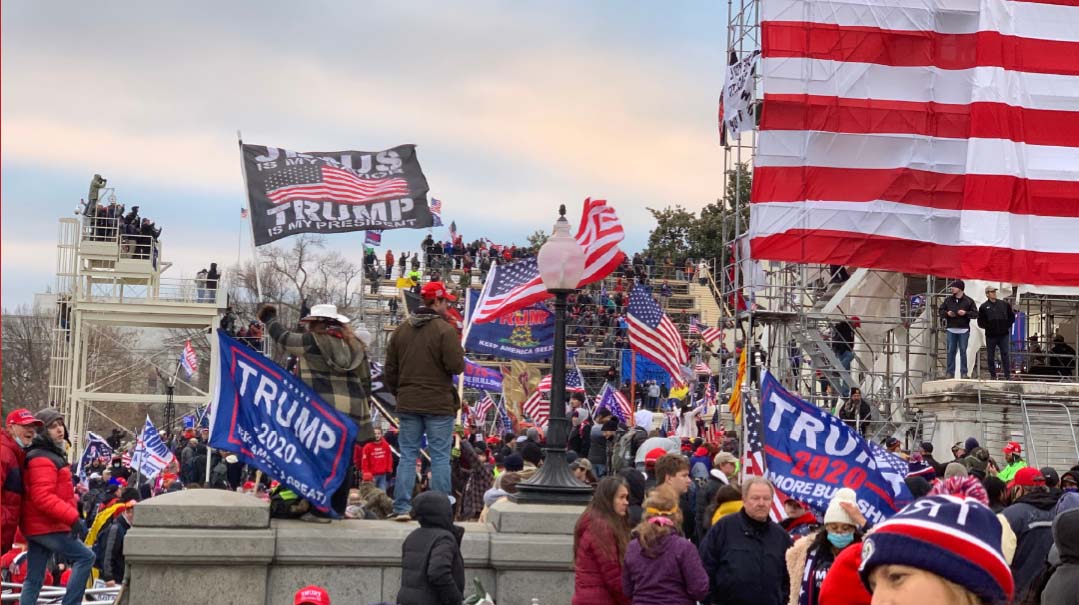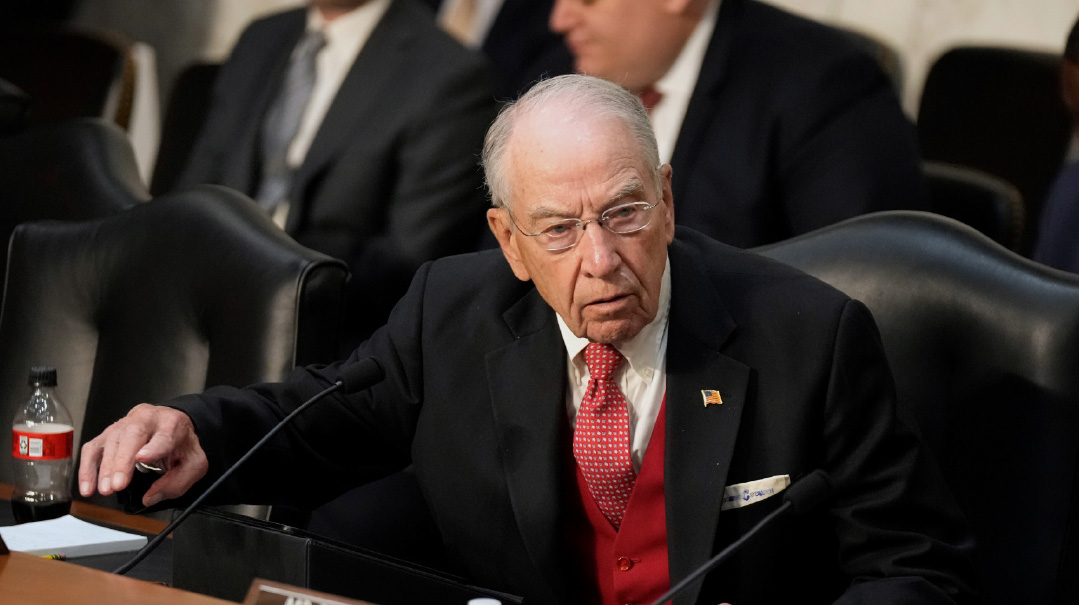Did Facebook Betray Democracy?

Did Facebook's pursuit of profit contribute to the Jan. 6th riots?

It doesn’t compare to the Japanese attack on Pearl Harbor that triggered America’s entrance into World War II, but January 6, 2021, is a day that will live in infamy in the annals of American history.
The House of Representatives had convened in the Capitol building to certify the Electoral College vote making Joe Biden America’s 46th president, following one of the nation’s most bitterly divisive and contested elections.
At that very hour, President Trump was delivering an impassioned speech to several thousand supporters, exhorting them to march to Capitol Hill to “save America” from the fraud he claimed robbed him of re-election.
When Trump finished, his most fervent supporters trooped to the Capitol, where another pro-Trump crowd had already formed. Events quickly spiraled out of control. Demonstrators stormed the Capitol, breaking doors and windows, forcing members of Congress to run for cover. Capitol police shot and killed one rioter. It took more than six hours to restore order.
Both Facebook and Twitter suspended Trump’s accounts. Facebook accused Trump’s posts of contributing to rather than diminishing the risk of ongoing violence. Twitter cited repeated and severe violations of its “civic integrity policy.” Ultimately, both social media giants silenced Trump by making the suspensions permanent.
Congress returned to session, sealing Biden’s victory, but the day’s headlines were laser-focused on Trump. He was accused of fomenting an insurrection or an attempted coup — charges that opponents can and will use against him if Trump runs again in 2024.
While Trump will always bear the lion’s share of the blame for January 6, an exposé aired Sunday night on the CBS News show 60 Minutes shows that the day’s events did not occur in a vacuum. If Trump’s involvement was complicit, the social media’s participation was implicit.
Scott Pelley of 60 Minutes interviewed 37-year-old Frances Haugen, who left Facebook a few months ago after serving as its lead project manager monitoring the platform for election misinformation. Facebook recruited her in 2019 for the election project. She agreed to join on the condition that she would work specifically against misinformation because she had lost a friend to online conspiracy theories. Haugen is well-qualified. She sports the names Google and Pinterest on her résumé, earned a degree in computer engineering from Olin University in Needham, Massachusetts, and a master’s degree in business at Harvard.
Haugen told Pelley that following the 2020 presidential election, Facebook was used by some of the organizers of the January 6 disturbances who took advantage of the fact that, by then, Facebook had turned off the safety systems they instituted during the campaign to reduce the flow of misinformation.
Haugen alleges that Facebook’s own research shows that “it amplifies hate, misinformation, and political unrest, but the company hides what it knows” because misinformation “keeps both users and advertisers ‘glued to the social network.’ ”
Once Haugen lost confidence in Facebook, she secretly copied tens of thousands of pages of Facebook internal research, and went public with allegations that the company is lying to the public when it claims to be making significant progress against hate, violence, and misinformation.
Haugen has sought protection from Facebook’s wrath and retaliation under the federal “whistleblower’s act” that protects employees who reveal confidential information related to workplace safety and health. Haugen’s attorney, John Tye, told 60 Minutes that Facebook, a publicly traded company, is subject to Securities and Exchange Commission laws, and cannot stop its employees from communicating and sharing documents with the SEC.
She alleges that Facebook’s corporate decision to prioritize revenues over public safety helped fuel the communications that led to the Capitol riot.
“And that really feels like a betrayal of democracy to me,” she told Pelley.
Pelley noted that prosecutors who filed charges against individual demonstrators cited evidence from Facebook posts, including pictures of armed partisans and text including “by bullet or ballot, restoration of the republic is coming!” While 60 Minutes noted that extremists used many platforms, Facebook was a prime offender.

An Addictive Influence
To parry this negative publicity, Nick Clegg, Facebook’s vice president of public policy and global affairs, wrote to employees that the responsibility for January 6 “rests squarely with the perpetrators of the violence,” adding that Facebook is not a “primary cause of polarization.”
While it might not be a primary cause, many experts argue that it is a leading purveyor.
“In my book Microtrends Squared, I spend a lot of time warning people that social media — rather than bringing us together — was tearing us apart by encouraging dug-in small groups,” says Mark Penn, president and managing partner of the Stagwell Group. “What we are seeing is the result of the tools that were supposed to connect us and instead are disconnecting us.”
A veteran political strategist and pollster, his client list has included world leaders such as Bill Clinton, Menachem Begin, and Tony Blair. I profiled Penn in early 2018 (“Political Detective,” Issue #704) and devoted the last section of the article to his deep concern over the outsized power and sway of social media.
I contacted Penn a few hours after the 60 Minutes report aired, in which Haugen also cited a different Facebook internal study showing that the company’s Instagram App harms teenage girls, especially those with suicidal thoughts and eating disorders.
“I think Facebook should spend less time on controlling political speech and more time on reducing the addictive influence on kids as pointed out by its own research,” Penn said. “That strikes me as the real priority emerging here.”
Another internal Facebook study from 2021 shows the company admitting: “We estimate that we may [take] action [on] as little as 3-5% of hate and about 6-tenths of 1% of V & I [violence and incitement] on Facebook despite being the best in the world at it.”
When Scott Pelley led Haugen with a statement that Facebook “essentially amplifies the worst of human nature,” she replied, “No one at Facebook is malevolent, but the incentives are misaligned. Facebook makes more money when you consume more content. People enjoy engaging with things that elicit an emotional reaction. And the more anger that they get exposed to, the more they interact and the more they consume.”
Facebook’s platform has been disruptive to European politics as well. Revelations from an internal document from 2019 showed that unnamed major political parties across Europe complained to Facebook that they feel forced to adopt more extreme policy positions, even if they know they are bad for society, to win over the hearts of the social media marketplace.
No details were given, but I would surmise that’s one reason why European heads of state cower in fear of Greta Thunberg when she makes one of her frequent appearances at demonstrations supporting the most excessive forms of green legislation.
Trump’s Code Words
What’s poison to Facebook may serve as a main course for Donald Trump, says Dr. Erez Yaakobi, an expert in political psychology at Ono Academic College and coauthor of Killer Instinct: The Complete Guide for the Candidate and the Campaign Manager. The Hebrew-language edition is being revised now to account for both the 2020 US presidential election and Israel’s four recent elections and will then be translated into English.
“What Trump was blamed for is his fault, but now he has new facts to take to his voters — that if Facebook had not acted the way it did, the riot might not have occurred,” Dr. Yaakobi said. “I’m sure that if he runs again in 2024, he will use this new information to say, ‘I told you again and again, it’s not me — it’s them.’ ”
The fact that Trump himself was the one who whipped his supporters into a frenzy on Facebook is an inconvenient obstacle that Trump should be able to overcome.
“In politics, facts are open to interpretation. Trump’s base already believes him, but the group most important to him are the ‘switchers.’ The ones who sometimes vote Republican and sometimes vote Democrat.”
Trump will certainly seize on Haugen’s catchphrase: “Facebook Betrays Democracy.”
“Here, she speaks in the language of the Democrats. If Trump uses these three words, it will echo among the switchers in the Democratic Party, because it’s based on facts that the Facebook whistleblower provided.”
John McLaughlin, CEO of McLaughlin and Associates, an advisor and pollster for Trump contends there are many more facts that the American media ignores, proving that accusations against Trump’s conduct on January 6 are part of a “purely political prosecution.”
“There were urban riots across the United State last year in Seattle, Portland, Minneapolis and many other cities. Violent left wing protestors who attacked the police and innocent citizens have been let go,” McLaughlin said. “In New York City the District Attorneys dropped charges. Besides these Facebook revelations more will come out. And the anger of middle America at the betrayal by the media and elites like Facebook with fuel a peaceful revolution at the ballot box next year in the midterm elections and that will help elect a smarter and even more effective President Trump in 2024.”
While Facebook officials declined a 60 Minutes request for an interview, they did issue a written statement saying: “Every day our teams have to balance protecting the right of billions of people to express themselves openly with the need to keep our platform a safe and positive place. We continue to make significant improvements to tackle the spread of misinformation and harmful content. To suggest we encourage bad content and do nothing is just not true. If any research had identified an exact solution to these complex challenges, the tech industry, governments, and society would have solved them a long time ago.”
Facebook is a $1 trillion company that will survive this latest assault on its integrity, thanks to its 2.8 billion users, comprising 60% of the Internet-connected people on Planet Earth.
Will its users survive Facebook’s methods and tactics?
One prominent political scientist is glum. Writing in the January 2020 edition of the Journal of Democracy, Francis Fukuyama, a Japanese-born political scientist and author of the 1992 book The End of History and the Last Man, noted that social media pioneers such as Google and Facebook exercise monopolistic control over the Internet.
Fukuyama says that while authoritarian rulers in Beijing and Moscow learned how to reshape the Internet for their own purposes, Internet in the Western world operates to serve the interests of the private companies that control it.
“The latter are not in principle opposed to democracy,” Fukuyama wrote, “but their self-interest has allowed them to be used by antidemocratic actors who have discovered that conspiracy stories and fabricated information often are rewarded with more clicks than the truth receives.”
The “legacy media” — companies that spent decades and billions of dollars developing journalistic standards for vetting and verifying information can’t compete.
“The rise of Google and Facebook undermined the old media’s business model. Today it is not clear what economic incentives there are to provide reliable news to broad democratic publics.”
“What Trump was blamed for is his fault, but now he has new facts to take to his voters — that if Facebook had not acted the way it did, the riot might not have occurred”
—Dr. Erez Yaakobi
Facebook should spend less time on controlling political speech and more time on reducing the addictive influence on kids
—Mark Penn
(Originally featured in Mishpacha, Issue 880)
Oops! We could not locate your form.







